
14.8K
Downloads
120
Episodes
The Reality Dysfunction Platform is the latest in unapologetic, thought-provoking discourse on Xicano identity, resistance, and liberation. Through podcasts, essays, and dialogue, we challenge conventional narratives, confront colonial legacies, and amplify voices committed to social transformation. Whether exploring cultural politics, insurgent theory, or grassroots organizing, The Reality Dysfunction Platform is where radical thought meets real-world action. #Control the Narrative. #Resist the Dysfunction.
Episodes

Tuesday Jun 17, 2025
#123 - Reclaiming The Past Through Alex Rivera's Sleep Dealer
Tuesday Jun 17, 2025
Tuesday Jun 17, 2025
In this episode of The Reality Dysfunction, Dr. Ernesto Mireles is joined by Scott Russell Duncan, Colton Campbell and Alex Garcia fellow thinkers and insurgent storytellers to dive deep into Alex Rivera’s prophetic 2008 film Sleep Dealer. What begins as a conversation about drones, borders, and labor quickly becomes a powerful indictment of settler colonialism, digital commodification, and the war on memory.
We explore the film’s dystopian vision of disconnected laborers—plugged into machines across borders—as a mirror of today’s racialized gig economy. Through Xicanx Gothic, racialized horror, and speculative fiction, the panel traces how Sleep Dealer flips the narrative from assimilation to ancestral return. From the sacred milpa to neural implants, from water theft to resistance, this episode asks: What happens when we name the machine—and choose to plant instead of plug in?
If you’ve ever questioned the cost of survival in a system built to erase you, or wondered what decolonial science fiction might sound like in Spanglish, this one’s for you.

Wednesday Mar 19, 2025
#122 - Adan and Pauline interview two first gen NAU professors
Wednesday Mar 19, 2025
Wednesday Mar 19, 2025
🎙️ First Gen Podcast | Adan & Pauline sit down with Drs. Manny Preciado & Ernesto Mireles to talk academia, hustle, and what brought them to NAU. Plus, their top advice for first-gen students — and the real secret to success. Don’t miss it!

Sunday Mar 16, 2025
#121 - First Gen reveals all
Sunday Mar 16, 2025
Sunday Mar 16, 2025
Adan and Pauline open up about their first year and talk about how things have developed from the first semester to the second semester.
Email Adan and Pauline directly at dysfunctionalfirstgen@gmail.com.

Sunday Jan 26, 2025
#120 - "I'm proud to be fucking Mexican, and that's on period."
Sunday Jan 26, 2025
Sunday Jan 26, 2025
POWER HOUSE EPISODE!
First Gen Podcasters Pauline and Adan talk politics and belonging in their most recent podcast. Their take on the impending (threatened) ICE raids and deportations. This one is a banger. Share far and wide.

Tuesday Jan 21, 2025
#119 - First Gen: We're Back!
Tuesday Jan 21, 2025
Tuesday Jan 21, 2025
In this episode Adan and Pauline discuss their first winter break, returning to campus and the existential dread of switching majors.
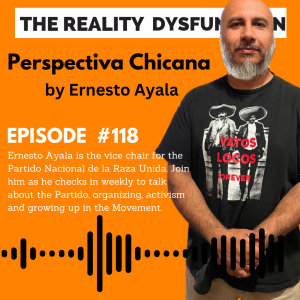
Friday Dec 06, 2024
#118 - Perspectiva Chicana
Friday Dec 06, 2024
Friday Dec 06, 2024
Join Ernesto Ayala is the Vice Chair for the Partido Nacional de la Raza Unida. Join him as he checks in weekly to talk about the Partido, organizing, activism and growing up in the Movement.
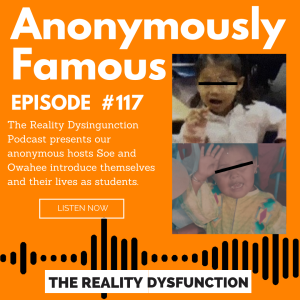
Thursday Dec 05, 2024
#117 - Anonymously Famous: You'll never see us coming
Thursday Dec 05, 2024
Thursday Dec 05, 2024
Soe and Owahee join The Reality Dysfunction Podcast as regulars with the Anonymously Famous series. Powerful stories to be told.

Monday Nov 25, 2024
#116 - First Gen: Pride with no remorse
Monday Nov 25, 2024
Monday Nov 25, 2024
In this episode Pauline and Adan talk about their backgrounds and the support of their families as the began their journey through higher education.
Producer: Ernesto Mireles

Monday Nov 11, 2024
#115 - First Gen Series - The election.
Monday Nov 11, 2024
Monday Nov 11, 2024
This week Dr. Ernesto, Pauline and Adan talk about the recent election of Donald Trump and among other things his promise to end the Department of Education.

Friday Nov 08, 2024
#114 - Ren Manning and BorderLinks
Friday Nov 08, 2024
Friday Nov 08, 2024
In this episode Dr. Ernesto, talks with Ren Manning the co-director of BorderLinks in Tucson, AZ.
BorderLinks is a community-based organization where people collectively learn, teach, reflect, share resources, and organize for justice in the borderlands. Through popular education rooted in place and lived experience, BorderLinks and community partners inspire and ignite action to transform unjust border and (im)migration laws and conditions. We belong to movements for social transformation & collective liberation.

Monday Nov 04, 2024
#113 - The First Gen Series
Monday Nov 04, 2024
Monday Nov 04, 2024
In this episode I want to introduce you to Adan and Pauline. Two first year students, please take a quick listen to our first conversation. We plan to record on Friday's and post by Monday so that there will be new fresh content on a regular basis. I want to thank all of you who have hung in there with the Reality Dysfunction this far and we're also really excited to continue this conversation about Chicano culture and Chicano politics into the 21st century.
In this new series I'll be working with students at Northern Arizona University, specifically 1st generation college students like myself, to have on-going conversations about their experiences and coming to campus, the changes that they see in themselves and the opportunities that they have to explore their history and their culture at a greater depth.

Tuesday Oct 22, 2024
#112 Why Peace is Impossible
Tuesday Oct 22, 2024
Tuesday Oct 22, 2024
This is a recording of a talk I thought I had lost. I gave this lecture on Nov. 15, 2014, at the Prescott College Masters Symposium. They never asked me back? The title of the talk is "Why Peace is Impossible."
I hope you enjoy it.

Friday Aug 16, 2024
#111 - Exploring Aztlan: From Myth to Insurgency
Friday Aug 16, 2024
Friday Aug 16, 2024
This presentation was given on August 15, 2024, over Zoom. It is a collaboration between the Chicano Liberation Committee of Denver, CO., and the Partido Nacional de la Raza Unida. Below is a description of the talk. This file is the presentation. Another file with the discussion will also be uploaded. The video of this meeting will be uploaded to YouTube and we will put the link to that in this description when it is.
"Aztlan represents more than a political stance; it is a declaration of Xicano identity and a call for resistance against settler colonial oppression. Aztlan embodies Xicano heritage, struggle, and a political vision for a future where our people are free from the constraints of a system never designed to serve us."
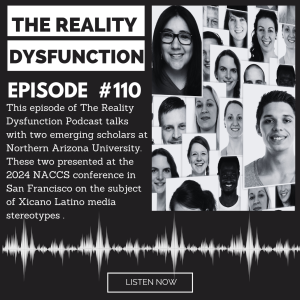
Tuesday May 21, 2024
Tuesday May 21, 2024
In this episode of The Reality Dysfunction I am speaking with two exception young scholars Candelario Moreno and Selah Hernandez. We are discussing their recent presentation at the National Association of Chicana Chicano Studies conference in San Francisco. Its a good talk.
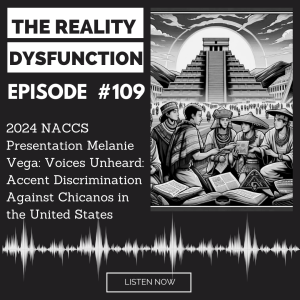
Tuesday May 21, 2024
Tuesday May 21, 2024
This episode is a recording of a National Association of Chicana Chicano Studies presentation by Melanie Vega. She is a first year student at Northern Arizona University in the political science department. The title of the panel was Voices Unheard: Accent Discrimination Against Chicanos in the United States.
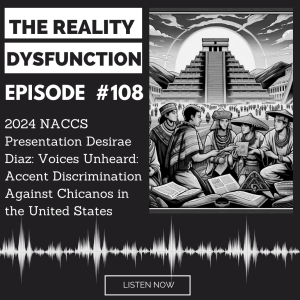
Tuesday May 21, 2024
Tuesday May 21, 2024
This episode is a recording of a National Association of Chicana Chicano Studies presentation by Desirae Diaz. She is a first year student at Northern Arizona University in the psychology department. The title of the panel was Voices Unheard: Accent Discrimination Against Chicanos in the United States.
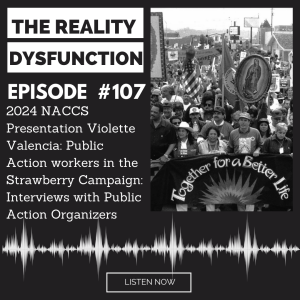
Monday Apr 29, 2024
Monday Apr 29, 2024
This recording is from the 2024 National Association of Chicana/Chicano Studies held in April 2024 in San Francisco. The three presenters are Brinley Carrillo, Demi Garcia and Violette Valencia. I have broken their presentation in to three separate podcasts to make it easier to listen. The abstract for the presentation is below.
Three years after the passing of Cesar Chavez in 1994, the United Farm workers under the direction of their new president Arturo Rodriguez began organizing Strawberry Workers in Watsonville. The Watsonville Strawberry Campaign followed the same organizing model the UFW had implemented during the grape campaigns of the 1960s-1980s. Taking on the Watsonville grower establishment through worker strikes and demonstrations
This panel will talk about the power dynamic between the growers, the UFW and the national community. Strikers and union members were treated poorly simply protesting and demanding their collective bargaining rights. The workers fighting in this campaign were known to be some of the most socially and economically exploited in the country.
Workers in Watsonville were fighting for a wage of $4.25 an hour and basic human necessities such as drinking water and clean toilets in the fields. This campaign was the biggest one for the UFW since the 1970s when it came to organizing farm labor. In addition, strawberry workers endured workplace conditions that made them even more susceptible to injuries, including no health insurance, which is especially serious when considering the amount of pesticides the workers were exposed to, and the health issues that arose from exposure.
Through interviews with public action organizers from several different states working for the United Farm Workers on the Strawberry Campaign as well as the President of the UFW at the time Arturo Rodriguez we will explore the perspective of those who were directly involved in the community organizing campaign and the reasoning behind their participation. What they saw as organizers across the country and what contributions they believe the Strawberry Campaign made to bettering conditions for workers in Watsonville.
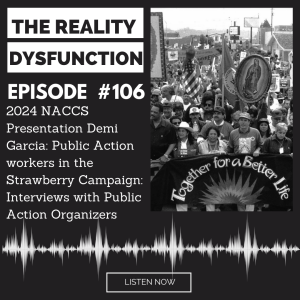
Monday Apr 29, 2024
Monday Apr 29, 2024
This recording is from the 2024 National Association of Chicana/Chicano Studies held in April 2024 in San Francisco. The three presenters are Brinley Carrillo, Demi Garcia and Violette Valencia. I have broken their presentation in to three separate podcasts to make it easier to listen. The abstract for the presentation is below.
Three years after the passing of Cesar Chavez in 1994, the United Farm workers under the direction of their new president Arturo Rodriguez began organizing Strawberry Workers in Watsonville. The Watsonville Strawberry Campaign followed the same organizing model the UFW had implemented during the grape campaigns of the 1960s-1980s. Taking on the Watsonville grower establishment through worker strikes and demonstrations
This panel will talk about the power dynamic between the growers, the UFW and the national community. Strikers and union members were treated poorly simply protesting and demanding their collective bargaining rights. The workers fighting in this campaign were known to be some of the most socially and economically exploited in the country.
Workers in Watsonville were fighting for a wage of $4.25 an hour and basic human necessities such as drinking water and clean toilets in the fields. This campaign was the biggest one for the UFW since the 1970s when it came to organizing farm labor. In addition, strawberry workers endured workplace conditions that made them even more susceptible to injuries, including no health insurance, which is especially serious when considering the amount of pesticides the workers were exposed to, and the health issues that arose from exposure.
Through interviews with public action organizers from several different states working for the United Farm Workers on the Strawberry Campaign as well as the President of the UFW at the time Arturo Rodriguez we will explore the perspective of those who were directly involved in the community organizing campaign and the reasoning behind their participation. What they saw as organizers across the country and what contributions they believe the Strawberry Campaign made to bettering conditions for workers in Watsonville.
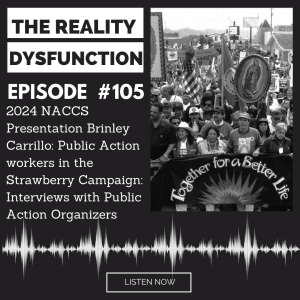
Monday Apr 29, 2024
Monday Apr 29, 2024
This recording is from the 2024 National Association of Chicana/Chicano Studies held in April 2024 in San Francisco. The three presenters are Brinley Carrillo, Demi Garcia and Violette Valencia. I have broken their presentation in to three separate podcasts to make it easier to listen. The abstract for the presentation is below.
Three years after the passing of Cesar Chavez in 1994, the United Farm workers under the direction of their new president Arturo Rodriguez began organizing Strawberry Workers in Watsonville. The Watsonville Strawberry Campaign followed the same organizing model the UFW had implemented during the grape campaigns of the 1960s-1980s. Taking on the Watsonville grower establishment through worker strikes and demonstrations
This panel will talk about the power dynamic between the growers, the UFW and the national community. Strikers and union members were treated poorly simply protesting and demanding their collective bargaining rights. The workers fighting in this campaign were known to be some of the most socially and economically exploited in the country.
Workers in Watsonville were fighting for a wage of $4.25 an hour and basic human necessities such as drinking water and clean toilets in the fields. This campaign was the biggest one for the UFW since the 1970s when it came to organizing farm labor. In addition, strawberry workers endured workplace conditions that made them even more susceptible to injuries, including no health insurance, which is especially serious when considering the amount of pesticides the workers were exposed to, and the health issues that arose from exposure.
Through interviews with public action organizers from several different states working for the United Farm Workers on the Strawberry Campaign as well as the President of the UFW at the time Arturo Rodriguez we will explore the perspective of those who were directly involved in the community organizing campaign and the reasoning behind their participation. What they saw as organizers across the country and what contributions they believe the Strawberry Campaign made to bettering conditions for workers in Watsonville.

Wednesday Apr 24, 2024
#104 - Why we need a party
Wednesday Apr 24, 2024
Wednesday Apr 24, 2024
Short piece from Dr. Ernesto on the need for claiming political power in a settler election year and beyond.
